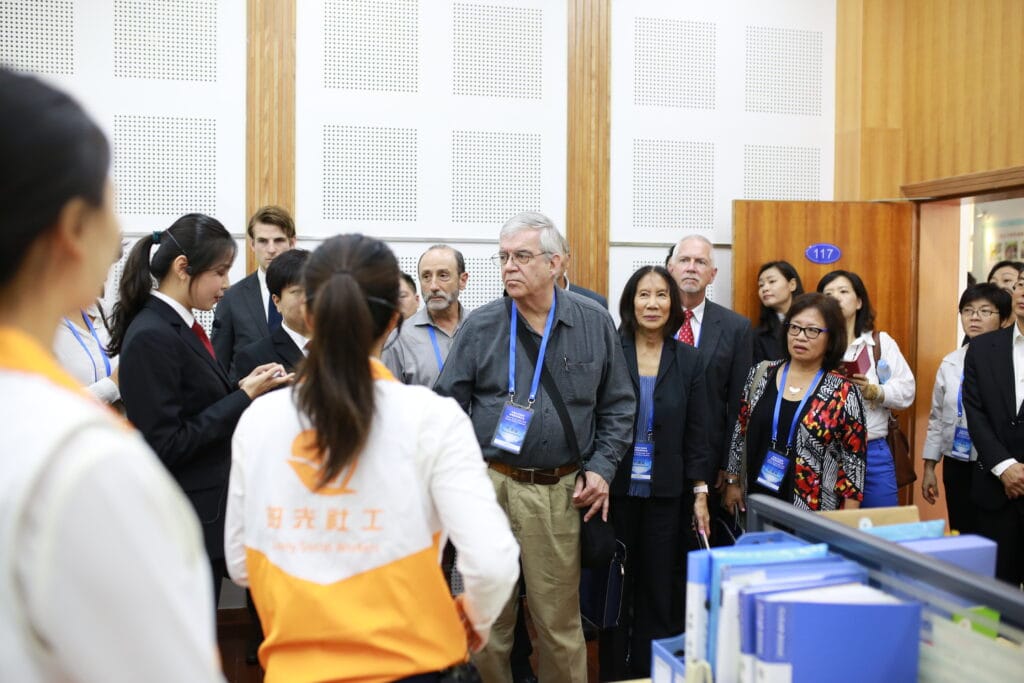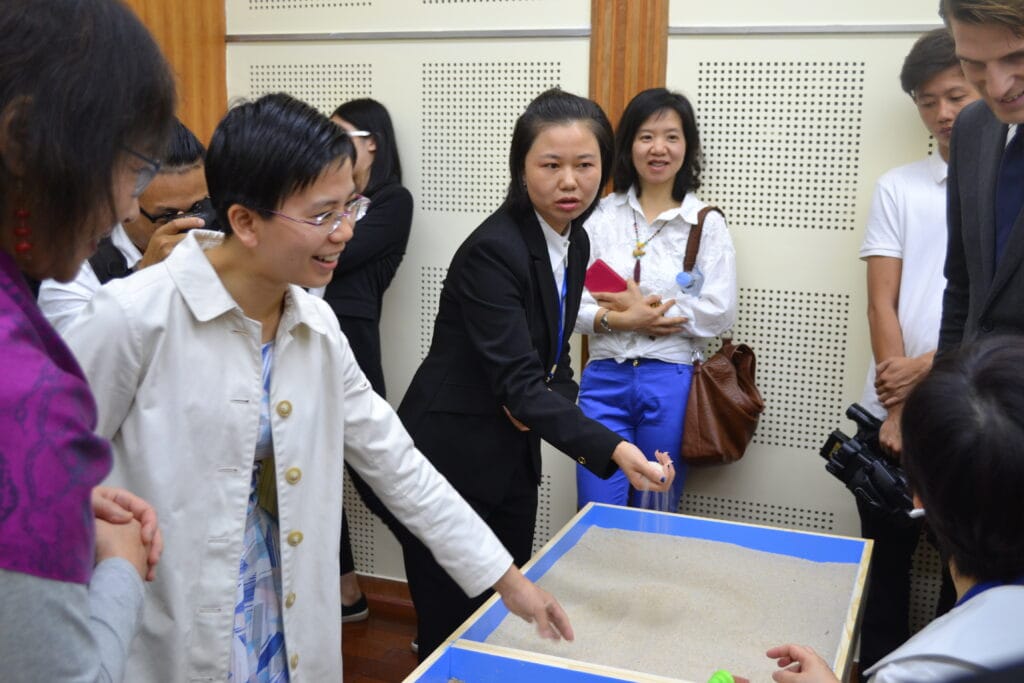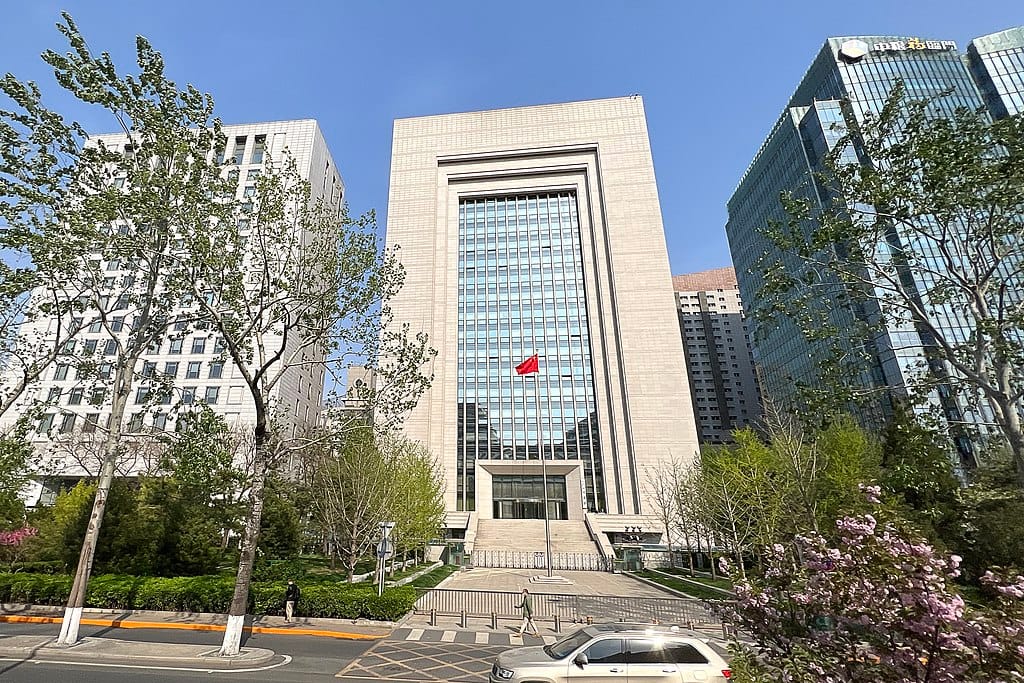EVENTS
 |
The American and Chinese delegation at the Juvenile Delinquent Assist & Education Campus of Baoan District, November 9. |
While President Donald Trump soft-pedalled human rights on his first state visit to China earlier this month, Dui Hua was busy holding its fifth juvenile justice exchange with the Supreme People’s Court (SPC) in Shenzhen. The exchange was held on November 8-9 and was attended by over forty Chinese participants, including representatives from the Office of Juvenile Trials under the Supreme People’s Court’s Research Department and juvenile judges from courts across fifteen provinces in China.
Dui Hua’s Executive Director John Kamm, Program & Development Manager Yin Yu, and Program & Publications Associate Xandra Xiao travelled to Shenzhen where they were joined by the US delegation consisting of five leading juvenile judges and juvenile justice experts. Judge Leonard Edwards led the US delegation, which included Patricia Lee, Managing Attorney for the Juvenile Unit of the San Francisco Public Defender’s Office; Judge Roger Chan, San Francisco Superior Court Judge and former Executive Director of the East Bay Children’s Law Offices; John Tuell, Executive Director of the Robert F. Kennedy National Resource Center for Juvenile Justice; and Shay Bilchick, founder and Director of the Center for Juvenile Justice Reform at Georgetown University. Former Dui Hua juvenile justice exchange participants Judge Julie Tang of the San Francisco Superior Court and Judge Elizabeth Lee of the San Mateo Superior Court joined the delegation as expert observers.
Discussion between the American and Chinese delegation was lively, with conversation spilling into the hallways in between sessions. Both sides agreed on the importance of promoting education and non-custodial measures in juvenile cases and stressed its overall long-term benefit in lowering juvenile delinquency and recidivism. The issue of the independence of the juvenile courts came up a number of times. Judge Edwards discussed the juvenile justice movement’s rejection of merging juvenile and criminal courts in the United States, due to the inherent differences between youths and adults. The need for specialized courts, judges, and social services that can appropriately service juveniles is critical. Children are not simply small adults. The Chinese delegation made clear that they too shared this overarching goal of “treating the juvenile offender as a child rather than the child as a criminal.” They reiterated the obstacles juvenile courts in China currently face in operating independent of criminal and family courts.
Questions arose from the American delegation on the issue of family engagement in juvenile cases involving China’s left-behind children, a population of sixty million children separated from their parents due to the mass migration of workers from China’s rural to urban regions. The Chinese side emphasized the government’s role in supporting welfare organizations and guardians such as grandparents in such cases, as well as specific measures including school tuition fee exemptions to alleviate the economic burdens faced by left-behind children. Family engagement was a challenge shared by both the American and Chinese delegation. John Tuell discussed the importance of providing families with the right tools and resources to help restore delinquent youths as well as providing families with formal opportunities to communicate with and provide feedback to the courts. Professor Song Yinghui discussed the similar challenges faced in China, where although schools do take on the responsibility of educating parents there is not nearly enough engagement and that perhaps China needs to consider legislation on providing more formal parental education.
On the morning of November 9, the American and Chinese delegations visited the Juvenile Delinquent Assist & Education Campus of Baoan District. The Campus hosted the Juvenile Trial Court of Baoan District, a Social Worker Center, and a Psychological Guidance Center; it is a model campus in China that aims to provide comprehensive rehabilitation support for juvenile delinquents. Interestingly, a juvenile detention center and an adult detention center operated by the Ministry of Justice are located adjacent to the Campus. The American delegation is the second foreign delegation to have visited the Campus, and the first since 2010, when the Australian Human Rights Commission was granted a tour.
The delegates first viewed the roundtable juvenile trial court of the campus, where they learned that around two to three percent of the juvenile cases undertaken by the Baoan Juvenile Trial Court involve juvenile girls. Next, they visited the Campus’ Social Worker Center, which provides support to juvenile delinquents during and throughout pre- and post-trial periods. To date, 2,974 juveniles have received support from the Center since the Campus’ establishment in September 2009. The Center has supported the rehabilitation of 1,188 juvenile delinquents on probation, eight of whom have been admitted to universities. The staff showed the visitors shelves where juvenile offenders’ sealed records were located; the files include judgments, social investigation reports, psychological assessment reports, and other documents, in neatly bound books. Addressing questions from American delegates, staff from the Campus noted that the reports are only accessible by the social workers or judges, even juveniles themselves cannot access their own records. This practice is different from the American system, where the records of juvenile cases belong to the juvenile involved.
 |
Social workers demonstrate record sealing protocol at the Social Worker Center. |
Next door was the Psychological Guidance Center that provides services to juveniles on probation. A psychologist from the Center demonstrated the Sand Play therapy for the visitors. It was noted that 96 percent of the psychological counseling recipients are males.
After departing the Baoan Campus, the delegation headed to the nearby Airmate Electrical Company, a local Shenzhen electrical appliance manufacturing company where youth on probation are employed. Twenty such juveniles currently work there. The delegation learned that companies that hire youth on probation can be provided tax incentives. After successfully completing their probation, the youth are allowed to stay in Shenzhen.
In the afternoon, the Shenzhen Intermediate People’s Court hosted a roundtable discussion between the American delegation and a group of senior court officials. The American delegation learned about the local pressures facing Shenzhen’s juvenile population and the preventative measures in place to curb juvenile delinquency. Owing to Shenzhen’s large migrant worker population, more than 90 percent of delinquents who come before Shenzhen’s juvenile courts are from outside Shenzhen. Shenzhen juvenile judges introduced the concept of “social worker stations” located inside courts that are staffed by social workers trained in providing youth psychological examinations. In cooperation with schools and parents, the social workers aim to capture a fuller picture of the juvenile’s case that is used in a “social investigation report” presented to the judge. It was evident that the cooperation between the courts, social workers, schools, and families, which was discussed by the Chinese delegation at the Seminar held the day before, was also operating in practice in Shenzhen’s juvenile courts. That said, many of the judges from the Chinese delegation also expressed the view that more work needs to be done in this field and that many courts still lack resources to provide adequate social services for its delinquent youth. Judges are often left to conduct the “social investigation reports” on their own, leaving them with inadequate time to preside over the juvenile court cases.
 |
Sand Play therapy at the Psychological Guidance Center. |
One of the most interesting exchanges occurred after Executive Director Kamm asked the judges what would happen to a 13-year old student who murders his or her teacher, bearing in mind that the legal age of responsibility in China is 14. The reply: just because the juvenile doesn’t bear legal responsibility doesn’t mean that there are no consequences for juveniles under the age of 14 who commit serious crimes. The family of the under-age juvenile must pay compensation to the victim’s family, and the youthful offender will most likely be sent to a work-study school.
Executive Director Kamm and Supreme People’s Court Judge Jiang Ming concluded the sessions with praise for the exchange and its enhancement of mutual trust between the United States and China. This exchange marks Dui Hua’s fifth exchange on juvenile justice with the SPC. Despite the increasingly challenging operating environment for NGOs in China since the introduction of the Foreign NGO Management Law, Dui Hua and the SPC’s cooperation and our shared goal of protecting the rights of juveniles remains resilient.
A troubling feature of China’s criminal justice system is that a judgment in a criminal trial can be postponed indefinitely after the trial concludes. American citizen Mark Swidan was detained on November 14, 2012. He was tried in 2013 by the Guangdong Jiangmen Intermediate People’s Court. The court has yet to announce its judgment; the Supreme People’s Court in Beijing has extended the deadline for the court to render a judgment at least a dozen times. The most recent extension was granted on October 14, 2017. This extension, as with the others, is for three months. A judgment must be announced or another extension must be granted by January 14, 2018. January 14 is Mark Swidan’s birthday.
In the meantime, Mark Swidan remains held in the Jiangmen Detention Center run by the Jiangmen Public Security Bureau. He receives monthly visits from an officer at the American Consulate in Guangzhou. Read More.
Featured: Clemency for Singing Red Songs (November 2)

Before Bo Xilai’s famous downfall in 2012, he was widely known for his role in launching Chongqing’s “Red Culture Movement” as the city’s Party Secretary. The movement was an attempt to revive Mao-era culture through a series of propaganda campaigns. A hallmark of the movement was the promotion of singing “red songs” from China’s “revolutionary era.” The songs reached nearly every corner of daily life in Chongqing, from televisions and radio programs to schools and workplaces. What is perhaps less known is how the red culture movement also found its way into China’s prisons.
Previous Digest: October 2017
John Kamm Remembers is a feature that explores Kamm’s advocacy stories prior to and since Dui Hua’s establishment in 1999
Enemy of Dialogue (Part 1 of 2)

In the Spring of 2004, I was asked by a librarian at a center in Hong Kong to help on a case of endangering state security. This center had on its shelves many valuable volumes – public security yearbooks, court records and the like – that contained the names of people detained in political cases in China. For five years, Dui Hua had done research here, uncovering the names of hundreds of political and religious prisoners. The librarian wanted me to help secure the release or better treatment for one of the center’s Mainland vendors. The vendor had recently been convicted of trafficking in state secrets because of his sales of old and used books to the center.
The man who had been convicted was a retired official in Fujian Province, a party member from a distinguished family, by the name of Jin Zhangqin. Before retirement this man oversaw Fujian’s provincial archives. After retirement, Mr. Jin set up a small business that specialized in buying old books from vendors in different parts of China. These vendors would buy volumes that had been discarded by government offices when they relocated. The government offices that supplied these vendors wanted to get rid of old volumes for which they no longer had use; the offices would sell the old books for as little as RMB 2 per kilogram to Jin’s partners, who would go through them and sell those considered most valuable to Jin, who would sell them, in turn, to the research center in Hong Kong. Some of the volumes were marked internal (nei bu) or even secret (ji mi); they dealt with mundane topics like economic statistics from collective enterprises in Hebei Province. All volumes were at least 10 years old, some were more than 20 years old.
Jin Zhangqin was convicted of trafficking in state secrets by the Fuzhou Intermediate People’s Court and sentenced to 10 years in prison on January 5, 2004. The sentence was upheld by the Fujian High People’s Court on March 9, 2004. (I obtained a copy of the judgment issued by the intermediate court and was relieved to find that none of the volumes dealing with political crime that Dui Hua had uncovered at the Hong Kong center were mentioned in the judgment.) Not long after the high court rejected Jin Zhangqin’s appeal, the retired official, who was then 64 years old, was moved to Jianyang Prison in northeast Fujian Province to begin serving his sentence.
I took up the case. In those days, I enjoyed good working relations with both the Ministry of Justice (MOJ) in Beijing and the provincial prison administration in Fuzhou. The deputy director general of the MOJ’s Department of Judicial Assistance and Foreign Affairs had the same surname as my Chinese surname, and he called me “older brother.” I had visited Xiamen Prison in September 2003, accompanied by senior officials from the provincial prison bureau. The visit had been an informative one. I had been briefed on how the sentence reduction system worked, knowledge I would put to good use, and been given detailed information on the inmate population of Fujian Province.
After taking up the case, I developed as much information on Jin as possible. I contacted a relative of Jin’s in New York who told me that Jin suffered a serious heart ailment that required surgery. I was asked to intervene with the authorities to see if an operation could be arranged in Fuzhou, where Jin Zhangqin’s family lived. Fuzhou was hundreds of miles from Jianyang Prison, and the medical care available in the provincial capital was far superior to the care available in Jianyang.
I began putting Jin’s name on prisoner lists, and wrote letters to the officials I had met when I visited Xiamen Prison in September 2003. I raised the elderly prisoner’s name with officials I met on my visits to Beijing.
A Breakthrough Meeting
A breakthrough took place on my April 2005 trip to Beijing. On April 5, I was met by senior officials of the Prison Administration Bureau and the Department of Judicial Assistance and Foreign Affairs in the minister’s conference room at the MOJ’s headquarters. This was the first time I had been invited to a meeting in the conference room. It was a well-appointed office with a large mahogany table. On the wall were photographs of all the officials who had served as justice ministers since the ministry had been established.
The meeting itself was successful. Agreement was reached that Dui Hua would host a delegation of ten ministry officials on a tour of prison facilities in California. I handed over a prisoner list and a special appeal for Jin Zhangqin; I asked that he be moved to Fuzhou for heart surgery, and that he be considered for medical parole. The deputy director general of the Prison Administration Bureau accepted my letter and told me he would personally take care of it.
The official was true to his word. Senior prison officials went to Jianyang Prison where, in the presence of Jin’s wife, the prisoner was told that he would have the surgery in Fuzhou. The operation was a complete success, but not long after the procedure he was sent back to serve his sentence in Jianyang Prison. (My work contributed to two sentence reductions, totaling 34 months, for Jin Zhangqin. He was released from prison in July 2010.)
The April 5 meeting ended with a commitment that we would meet again on my next visit to Beijing in late June or early July. I didn’t know it at the time, but the April 5 meeting would be the last time I set foot in the MOJ’s headquarters. A new Minister of Justice was about to be appointed, a woman by the name of Wu Aiying.
To be continued in Dui Hua’s December Digest.
